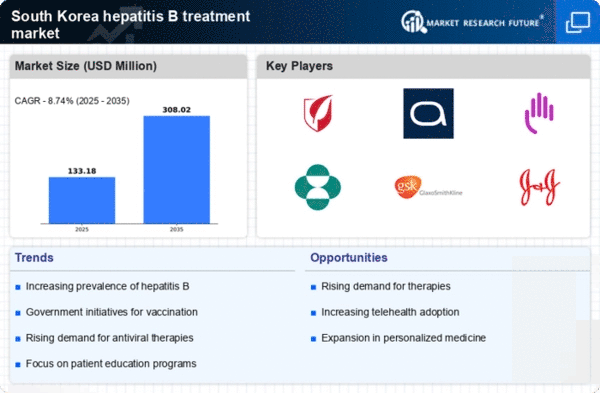Rising Prevalence of Hepatitis B
The increasing prevalence of hepatitis B in South Korea is a critical driver for the hepatitis B treatment market. Recent statistics indicate that approximately 3.5 million individuals are living with chronic hepatitis B in the country. This high prevalence necessitates effective treatment options, thereby propelling market growth. The South Korean government has recognized the urgency of addressing this public health issue, leading to enhanced funding for hepatitis B treatment programs. As a result, healthcare providers are more inclined to invest in innovative therapies and screening methods. The rising number of patients seeking treatment is likely to stimulate demand for antiviral medications and other therapeutic interventions, ultimately shaping the landscape of the hepatitis b-treatment market. Furthermore, the focus on reducing the disease burden aligns with national health objectives, further driving market expansion.
Government Initiatives and Policies
Government initiatives aimed at combating hepatitis B significantly influence the hepatitis b-treatment market. In South Korea, the Ministry of Health and Welfare has implemented various policies to enhance screening and treatment accessibility. These initiatives include subsidizing antiviral medications and promoting vaccination programs, which have been shown to reduce transmission rates. The government's commitment to eradicating hepatitis B by 2030 aligns with the World Health Organization's goals, creating a favorable environment for market growth. Additionally, public health campaigns raise awareness about the importance of early detection and treatment, encouraging more individuals to seek medical assistance. As a result, the hepatitis b-treatment market is likely to experience increased demand for effective therapies and preventive measures, driven by supportive government policies and funding.
Growing Demand for Preventive Measures
The growing demand for preventive measures against hepatitis B is a notable driver for the hepatitis b-treatment market. In South Korea, vaccination programs have been instrumental in reducing the incidence of new infections. The government has prioritized hepatitis B vaccination for newborns and high-risk populations, contributing to a decline in transmission rates. This proactive approach not only protects individuals but also alleviates the long-term burden on the healthcare system. As awareness of the importance of prevention increases, more individuals are likely to seek vaccination and screening services. Consequently, this trend is expected to drive the hepatitis b-treatment market, as early detection and preventive strategies are integral to effective disease management. The emphasis on prevention aligns with broader public health goals, further reinforcing the market's growth potential.
Increased Focus on Patient-Centric Care
The increased focus on patient-centric care is transforming the hepatitis b-treatment market. Healthcare providers in South Korea are increasingly adopting a holistic approach to treatment, emphasizing the importance of patient engagement and shared decision-making. This shift is likely to enhance treatment adherence and improve health outcomes for individuals living with hepatitis B. Moreover, the integration of patient feedback into treatment protocols allows for more tailored therapeutic options, addressing the unique needs of each patient. As healthcare systems prioritize patient satisfaction and quality of care, the demand for innovative treatment solutions is expected to rise. This trend not only benefits patients but also drives the hepatitis b-treatment market, as providers seek to offer comprehensive care that aligns with patient preferences and expectations.
Technological Advancements in Treatment
Technological advancements in treatment options are reshaping the hepatitis b-treatment market. Innovations in drug development, such as the introduction of direct-acting antivirals, have shown promising results in managing hepatitis B. These therapies not only improve patient outcomes but also enhance adherence to treatment regimens. In South Korea, the adoption of telemedicine and digital health solutions has further facilitated patient access to care, allowing for remote monitoring and consultations. This technological integration is likely to increase patient engagement and adherence, ultimately driving demand for hepatitis b treatments. Moreover, ongoing research and development efforts are expected to yield new therapeutic options, potentially expanding the market. As healthcare providers embrace these advancements, the hepatitis b-treatment market is poised for significant growth, reflecting the evolving landscape of hepatitis B management.

















